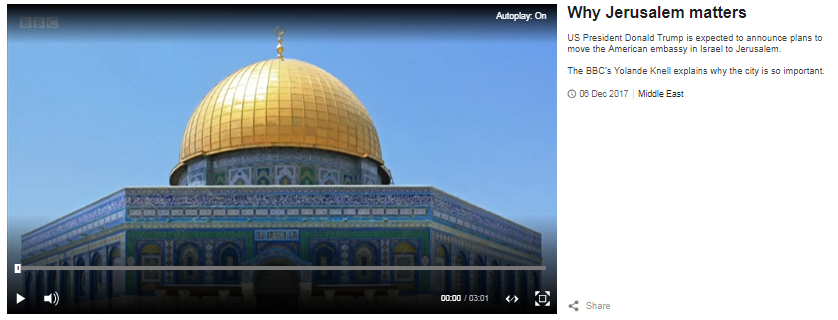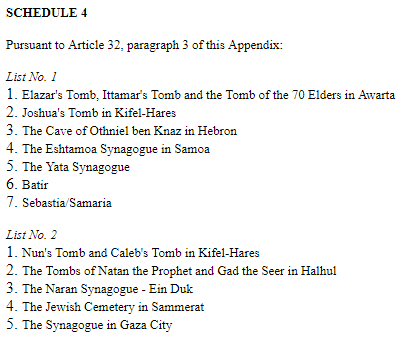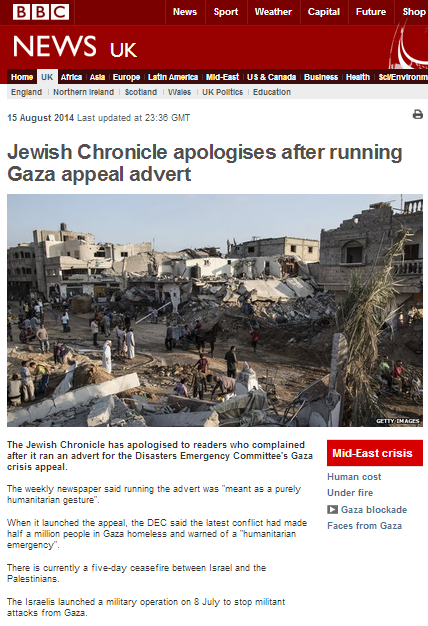Although the BBC has been telling its audiences that “the Palestinians want East Jerusalem to be the capital of a future Palestinian state” for many years, since the US president’s announcement of recognition of Jerusalem as Israel’s capital on December 6th 2017 that messaging has been promoted on a variety of BBC platforms on an almost daily basis.
BBC portrayals of the topic usually include the narrative seen in a frequently reused backgrounder on Jerusalem produced by Yolande Knell in which audiences were led to believe that a Palestinian capital in “east Jerusalem” is an already agreed component of the two-state solution rather than a topic to be discussed in final status negotiations.
“Of course, Palestinians see things starkly differently. They want east Jerusalem as their capital.
And that’s part of the long-standing international formula for peace here, known as the “two-state solution”.
Knell also portrayed the two-state solution in terms that dovetail with the PLO’s interpretation of that term.
“Basically the idea that an independent Palestinian state would be created alongside Israel, along the boundaries that existed before 1967, it’s written up in UN resolutions.” [emphasis added]
Of course the prime motivation behind Palestinian claims to a capital in the parts of Jerusalem occupied by Jordan between 1948 and 1967 is control over Temple Mount but the BBC repeatedly fails to adequately clarify that important point to its audiences.
Neither does it bother to inform them of the Palestinian Authority’s record on upholding agreements it has already signed with Israel regarding other holy places.
Under the terms of the Oslo Accords, freedom of access to and worship at holy sites was guaranteed.
“The agreement guarantees freedom of access to and freedom of worship at the holy sites, and defines access arrangements for the holy places located in Areas “A” and “B”. With regard to Rachel’s Tomb in Bethlehem and Joseph’s Tomb in Nablus, special arrangements are set out in the agreement which will also guarantee freedom of access and freedom of worship.”
“ARTICLE 32
Religious Sites
- Responsibility over sites of religious significance in the West Bank and the Gaza Strip (hereinafter – “Holy Sites”) will be transferred to the Palestinian side. In Area C, this responsibility will be transferred gradually to Palestinian jurisdiction that will cover West Bank and Gaza Strip territory except for the issues that will be negotiated in the permanent status negotiations, during the further redeployment phases, to be completed within 18 months from the date of the inauguration of the Council.
- Both sides shall respect and protect the listed below religious rights of Jews, Christians, Moslems and Samaritans:
- protection of the Holy Sites;
- free access to the Holy Sites; and
- freedom of worship and practice.
- a. The Palestinian side shall ensure free access to, respect the ways of worship in and not make any changes to, the Jewish Holy Sites listed in List No. 1 of Schedule 4.
- The Palestinian side shall ensure free access to, and respect the ways of worship in, the Jewish Holy Sites listed in List No. 2 of Schedule 4 .
- Schedule 4 shall be updated commensurate with the gradual transfer of responsibility in accordance with paragraph 1.
- The holy site of Nebi Musa shall be under the auspices of the Palestinian side for religious purposes.
- During religious events that take place three times a year and other special occasions that shall be coordinated with the Israeli authorities, Palestinians shall have the right to religious pilgrimage to the Al-Maghtas [in Jordan – ed] under the Palestinian flag. Safe passage will be provided from the Jericho Area to Al-Maghtas for this purpose.”

Obviously Israeli Jews are not able to visit the synagogue in Gaza City today and visits to additional sites on that list are either virtually impossible or severely restricted. Some of those holy and historically important sites have been vandalised, including Joseph’s Tomb which – as the BBC reported at the time – was set ablaze by Palestinian rioters in October 2015.
Holy places to which access is supposedly guaranteed by the Oslo Accords have also been the scene of numerous terror attacks and planned attacks – most recently on January 15th when an explosive device planted at the entrance to Joseph’s Tomb was discovered just before a visit by worshippers. That incident did not receive any BBC coverage whatsoever.
Some of the religious sites included in the Oslo Accords – Rachel’s Tomb and the Cave of Machpelah – have been the subject of motions instigated by the Palestinian Authority and passed by UNESCO that are designed to negate their Jewish heritage. Holy sites in Jerusalem have also been the subject of deliberately politicised UNESCO resolutions denying Jewish history.
Despite its public purpose obligation to provide audiences with “impartial news and information to help people understand and engage with the world around them” the BBC has not produced any content relating to the failure of the agreement that the Palestinians signed over two decades ago to guarantee freedom of access for Jews to religious sites under the control of the Palestinian Authority and to safeguard those sites.
However, the BBC’s copious multi-platform amplification of the simplistic narrative according to which a Palestinian capital in ‘East Jerusalem’ is the “formula for peace” continues apace.
Related Articles:




